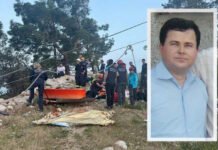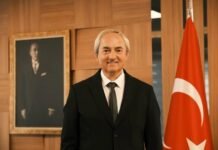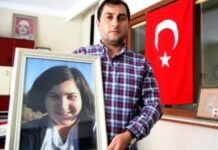Journalists who appeared before a judge on Wednesday at the İstanbul 25th High Criminal Court denied accusations of taking part in or supporting a controversial coup attempt on July 15, 2016 in Turkey and asked to be released.
Thirteen journalists who are charged with participation in the coup attempt are currently standing trial.
Cihan Acar, who asked the court for a fair trial and for his release, said his conversations with 18 people were found suspicious. “Seven of these people are journalists, five of them are lawyers and five of them are the lawyers of the newspaper for which I used to work,” said Acar.
Arguing that the investigation into coup participation had zero evidence when they were arrested, Acar revealed the names of alleged ByLock users he spoke with on the phone. He said he only communicated with them for the purpose of collecting data as he was writing news reports.
Turkish authorities believe using the mobile phone application ByLock is a sign of being a member of the Gülen movement. Tens of thousands of civil servants, police officers and businessmen have either been dismissed or arrested for using ByLock since the failed coup attempt.
Another journalist, Abdullah Kılıç, argued he had an account at Bank Asya, a closed bank affiliated with the Gülen movement, in order to pay his daughter’s tuition and to receive his salary from the Meydan daily. Kılıç, who was also accused of talking to people with ByLock on the phone, said he is a journalist and that he also talked to the prime minister at night.
“There are more than 1,000 politicians and journalists in my address book. Ninety percent of suspected conversations happened before 2013. There was no ByLock at that time,” said Kılıç.
Kılıç said the fact that he worked for the Meydan daily for 11 months was written in the indictment as if it were a crime. Reading the tweets he posted on the night of the coup attempt, Kılıç claimed he had been against the coup from the beginning.
Denying claims about being the owner of the Türk Solu daily, Gökçe Fırat Çulhaoğlu said he was the lead writer for the newspaper, the distribution of which was not illegal, unlike what the indictment said, but that none of the distribution companies wanted to distribute it.
Displaying headlines and news reports from the daily, Çulhaoğlu said he and his paper have always been against the Gülen movement.
Journalist Bünyamin Köseli said he was working on opening an antique store after he had been left unemployed. “Would someone who knows about a coup attempt in the evening be keeping himself busy with such things? Am I contributing to the coup by trying to open an antique store while some people are planning the coup?” asked Köseli.
Denying claims about having a credit card from Bank Asya, Köseli said he hadn’t used any credit cards in the last 10 years.
Journalists who were accused of membership in the faith-based Gülen movement in another investigation into Gülen-affiliated media were acquitted after the first hearing yet were detained again before their release due to another investigation immediately launched into their alleged coup participation. The prosecutor and the judges who released the journalists were also dismissed.
Of the 13 journalists, Ali Akkuş was released after being detained and the other 12 journalists were arrested after a two-week period of detention.
An indictment drafted by the İstanbul Chief Public Prosecutor’s Office that sought two consecutive life sentences for the 13 journalists on coup charges was accepted by the 25th High Criminal Court in İstanbul.
The indictment revealed that the suspects are accused of membership in a terrorist organization due to their stories, critical tweets and retweets and of attempting to destroy the constitutional order and attempting to overthrow the government of the Republic of Turkey.
The journalists named in the indictment are National Party (UP) leader and Türk Solu weekly columnist Gökçe Fırat Çulhaoğlu, Yakup Çetin, Bünyamin Köseli, Cihan Acar, Abdullah Kılıç, Oğuz Usluer, Hüseyin Aydın, Murat Aksoy, Mustafa Erkan, Seyit Kılıç, Yetkin Yıldız, Ali Akkuş and pop singer and journalist Atilla Taş.
Turkey is ranked 155th out of 180 countries in Reporters Without Borders (RSF) 2017 World Press Freedom Index. The situation of media in Turkey has become critical under the state of emergency proclaimed after the coup attempt.
Turkey is the biggest jailer of journalists in the world. The most recent figures documented by the Stockholm Center for Freedom (SCF) has showed that 275 journalists and media workers are now in jails as of August 16, 2017, most in pre-trial detention languishing in notorious Turkish prisons without even a conviction. Of those in Turkish prisons, 250 are arrested pending trial, only 25 journalists remain convicted and serving time in Turkish prisons. An outstanding detention warrants remain for 135 journalists who live in exile or remain at large in Turkey.
Detaining tens of thousands of people over alleged links to the movement, the government also closed down more than 180 media outlets after the controversial coup attempt. Turkey’s Contemporary Journalists’ Association (ÇGD) recently announced that more than 900 press cards were cancelled.
Turkey survived a controversial military coup attempt on July 15 that killed 249 people. Immediately after the putsch, the Justice and Development Party (AKP) government along with Turkey’s autocratic President Erdoğan pinned the blame on the Gülen movement.
Fethullah Gülen, who inspired the movement, strongly denied having any role in the failed coup and called for an international investigation into it, but President Erdoğan — calling the coup attempt “a gift from God” — and the government initiated a widespread purge aimed at cleansing sympathizers of the movement from within state institutions, dehumanizing its popular figures and putting them in custody.
Turkey has suspended or dismissed more than 150,000 judges, teachers, police and civil servants since July 15. Turkey’s Justice Ministry announced on July 13 that 50,510 people have been arrested and 169,013 have been the subject of legal proceedings on coup charges since the failed coup. (SCF with turkishminute.com)
















